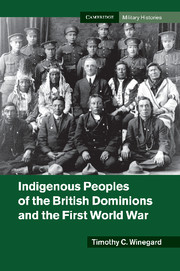Book contents
- Frontmatter
- Contents
- Figures
- Maps
- Tables
- Acknowledgements
- Note on the text
- Introduction
- 1 Colonization and the settler state
- 2 Racial constructs and martial theories
- 3 Precedents of military pragmatism
- 4 Dominion defence acts
- 5 1914: Subjugated spectators
- 6 1915–1916: King and country call
- 7 1917–1918: All the King’s men
- 8 Indigenous soldiers
- 9 The home front
- 10 Peace with prejudice
- Conclusion
- Bibliography
- Index
- References
3 - Precedents of military pragmatism
Published online by Cambridge University Press: 05 June 2014
- Frontmatter
- Contents
- Figures
- Maps
- Tables
- Acknowledgements
- Note on the text
- Introduction
- 1 Colonization and the settler state
- 2 Racial constructs and martial theories
- 3 Precedents of military pragmatism
- 4 Dominion defence acts
- 5 1914: Subjugated spectators
- 6 1915–1916: King and country call
- 7 1917–1918: All the King’s men
- 8 Indigenous soldiers
- 9 The home front
- 10 Peace with prejudice
- Conclusion
- Bibliography
- Index
- References
Summary
The inclusion of indigenous men in colonial and Dominion military structures varied and was conditional upon direct needs, managed at the discretion of imperial and Dominion administrations. In all Dominion experiences, indigenous peoples were utilized as scouts to fulfil British and colonial desiderata. The indigenous motivation for most participation was revenge on traditional enemies and to secure European favour to promote self-interest. In South Africa, where the native population greatly outnumbered that of Europeans, blacks were primarily ‘recruited’ by European powers as unarmed labourers during times of war. In addition, indigenous inclusion in Dominion expeditionary forces prior to the First World War was contemplated by all nations, but actual employment was dependent upon the assessment of needs. The official policy of indigenous exclusion, promulgated conjointly by the imperial and Dominion governments during the Second Anglo-Boer War, remained the precedent at the outbreak of the First World War.
The indigenous inhabitants of Newfoundland-Labrador did not participate in military campaigns during North American colonial wars because there were very few indigenous peoples left on the island and those present in Labrador were remote and reclusive. The Beothuk became extinct in 1829 and, although Mi’kmaq had settled on the southwest coast in 1720, they numbered no more than 175 by the end of the Seven Years’ War. These Mi’kmaq did not militarily support their traditional French ally; rather, they were concerned with fishing and hunting to support the lucrative trade in furs.
- Type
- Chapter
- Information
- Publisher: Cambridge University PressPrint publication year: 2011



